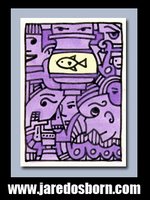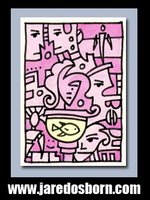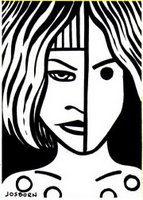
I bought some new pencils today. A pack of twelve 4B drawing pencils. 4B is the designation for how soft the graphite in a pencil is. The scale goes from 9H which is nearly as hard as a rock and leaves a light grey line to 9B which is so soft that the graphite almost leaps from the pencil point onto the paper creating a dark line. The H’s run from a single H up to nine H’s with all the numbers in between (H, 2H, 3H, 4H, 5H, 6H, 7H, 8H, 9H)and the B’s the same (B, 2B, 3B, 4B, 5B, 6B, 7B, 8B, 9B). Though the sevens through nines of both H’s and B’s are rarely seen. A 4B is one of the softer pencils and I like it on paper and a 6B on canvas.
Sometimes a job calls for a certain pencil. For instance you would never do mechanical drafting with soft B of any kind. Too messy. I think mechanical drawing is mostly computerized now anyway. So pencils might not even be a the right tool for that job.
Pencil choice is generally personal preference. And it is a tough personal preference to settle on. It takes more self discovery than you would think. That is because art education, even beyond school, is based on the “critique”. Which often leads to no self discovery.
Critiquing someone’s art work should consist of:
1) Looking a the art and determining what the artist is trying to do or say.
2) Giving the artist advice on how to reach the goal he is aiming for.
That rarely happens. What normally happens is:
1) Someone looks at an artist’s work.
2) That someone tells you how he’d do it.
This is where pencil choice comes in. When someone tells you how they’d do it the “it” they are talking about is really a specific technique. You might think you are getting advice on drawing but really the advice is on a specific drawing technique that you may or may not be suited for. It may not even be suited for the work that is being critiqued. The advice is about the person giving the critique and not you. So instead of learning to draw better you end up trying a specific technique usually with a specific pencil thinking you are learning to draw better. You’re not. If the pencil or technique is not suited to you as an artist you may end up struggling and not knowing why. That hurts more than helps. It’s not easy being a young artist. There is a lot to learn and confusing “drawing” with “technique” doesn’t help.
All of this emphasis on critique and looking for mentors is, of course, because artists, young and old, dream of learning the secret to drawing. There is no secret but that doesn’t stop us from dreaming. We all know that if we could just learn that secret we could draw exactly like DaVinci. If we listen to one more critique, read one more book, listen to one more lecture, or see one more museum show we just might discover the secret. This can make it harder to find the right pencil for you because you’re always trying to find the right pencil for DaVinci.
Pencils are such a basic tool that they are often overlooked. A lot of artists don’t give much thought to their pencils and end up using whichever one that they were told to use by someone they respected who gave them a critique. If they would just try some others their work might improve. Mine did when I finally started using the soft B’s. Those pencils were frowned upon by a lot of cartoonists and comic book artists (a field I’ve wallowed in) as impossibly messy and difficult to ink over. Both those assertions are true but there are ways around them. You have to find all the ways around conventional pencil wisdom yourself. Critiques have a lot of conventional wisdom in them.
Some people even find it odd that anyone would give it any thought at all. But no one finds it odd that a person would have a favorite hammer or baseball bat or any other tool that people use every day in other fields. You wouldn’t expect a bowler to pick up just any old ball and roll his best. People even have their favorite pickup trucks that get the job done. It’s the same with pencils. They just all look the same.



